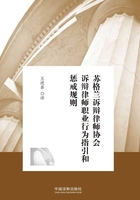
VI The Corporate Spirit of the Profession
1.The corporate spirit of the profession ensures a relationship of trust between lawyers for the benefit of their clients and in order to avoid litigation.It can never justify setting the interests of the profession against those of justice or of those who seek it.
2.In some Community countries, all communications between lawyers(written or by word of mouth)are regarded as being confidential.This principle is recognised in Belgium, France, Italy, Luxembourg and the Netherlands.The law of the other countries does not accept this as a general principle: even the express statement that a letter is confidential(or“without prejudice”)is not always sufficient to make it so.In order to avoid any possibility of misunderstanding which might arise from the disclosure of something said in confidence, the Consultative Committee considers it prudent that a lawyer who wishes to communicate something in confidence to a colleague the rules of whose country are different from his own, should ask beforehand whether and to what extent his colleague is able to treat it as such.
3.A lawyer who seeks the assistance of a colleague in another country must be sure that he is properly qualified to deal with the problem.Nothing is more damaging to trust between colleagues than a casual undertaking to do something which the person giving it cannot do because he is not competent to do it.It is therefore the duty of a lawyer who is approached by a colleague from another country not to accept instructions in a matter which he is not competent to undertake.He should give his colleague all the information necessary to enable him to instruct a lawyer who is truly capable of providing the service asked for.
4.As regards the financial obligations of a lawyer who instructs a lawyer of another country, the Council for Advice and Arbitration of the Consultative Committee issued the following opinion on 29th January 1977:
In professional relations between Members of Bars of different countries, where a lawyer does not confine himself to recommending another lawyer or introducing him to the client but himself entrusts a correspondent with a particular matter or seeks his advice, he is personally bound, even if the client is insolvent, to pay the fees, costs and outlays which are due to the foreign correspondent.The lawyers concerned may, however, at the outset of the relationship between them make special arrangements on this matter.Further, the instructing lawyer may at any time limit his personal responsibility to the amount of the fees, costs and outlays incurred before intimation to the foreign lawyer of his disclaimer of responsibility for the future.